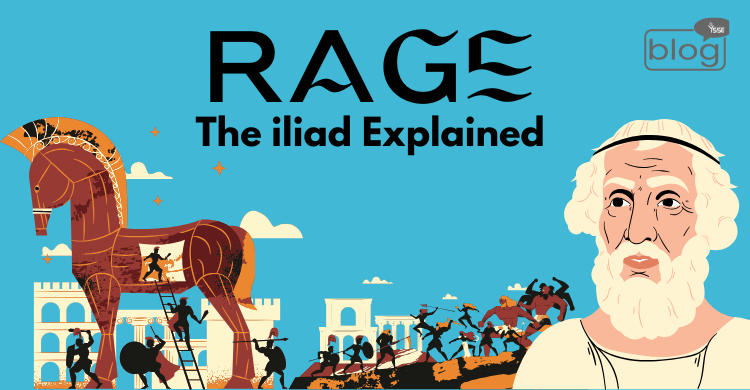The Iliad is the most famous work of the blind Greek poet, Homer. Homer made Greek mythology immortal through his imagination in this epic. The epic relates to the Trojan War, which lasted for almost 10 years and finally ended with the fall of Troy. The Iliad analyzes how anger and revenge lead to the collapse of a beautiful city and civilization.
The war broke out as a result of the abduction of Helen, wife of King Menelaus of Sparta, by Prince Paris of Troy, a son of King Priam, and then taking her to Troy. Due to that fact, Menelaus declared war and united all Greek city-states’ armies under the confederation called Achaean.
These were the kings who, having been invited to vie with each other for her hand in marriage before she was abducted, had all sworn an oath to protect her. The kings, then, bound by their vow, marshaled their armies and set upon Troy.
Troy was a very beautiful city that was well-protected with unbroken walls; thus, the city was ready for war. Paris did not want to return Helen because he felt that she had been gifted by the goddess of love, Aphrodite.
Now, in the ninth year of the war and at the beginning of the poem, the Achaeans raid cities that are allied with Troy; the leader, Agamemnon, seizes a priest’s daughter. He had called on Apollo, and eventually, the Achaeans were afflicted and were compelled to return the girl. However, his demand for Achilles’ concubine as compensation sent him into a rage. Achilles too pulled out of the battle.
The gods are always interfering in the war: Achilles’ mother, Thetis, called upon Zeus to favor the Trojans as revenge for her son’s insult. Zeus granted this request, hence changing the tide of war.
The inconclusive duel between Paris and Menelaus is followed by a series of victories for the Trojans, led by Hector, brother of Paris, favored by the gods, and pushing back the Achaeans. At Hector’s approach to the Achaean ships, Patroclus, companion of Achilles, wearing the armor of Achilles, sallies onto the field. The Trojans retreat in confusion, thinking him to be Achilles, but with Apollo’s help, Hector kills Patroclus.
Enamored with the death of Patroclus, Achilles returns in a rage to battle. Wearing his impenetrable armor, he kills many Trojans and even fights the river god Xanthus. The Trojan people, frightened, retreat behind their walls, but Hector does not listen to his father’s advice to stay inside the walls for protection. In the final combat, with the help of Athena, Achilles manages to kill Hector and drags his body to the Achaean camp.
On the ninth day, the gods intervene to allow King Priam to enter Achilles’s camp and plead for Hector’s body. Touched by his plea, Achilles returns the body for a decent burial.
Later traditions ascribed the climax of the war to guile—the Trojan Horse. While appearing to retreat, the Greeks left in front of the gate of Troy a huge wooden horse and dedicated it to the gods. The Trojans took this horse inside the city as a victory symbol, not knowing that it was housing Greek warriors. It was in the darkness of night that the hidden Greeks emerged and opened the gates for the pouring of the returning Greek army inside and sacked Troy, which had been in continuous action for ten long years.
The Iliad does not cover the defeat of Troy but depicts the themes of wrath, honor, and interference of gods in human affairs that remain memorable in literature and mythology.
To read more blogs, click here
Writer
Fazlul Karim
Intern, Content Writing Department
YSSE

